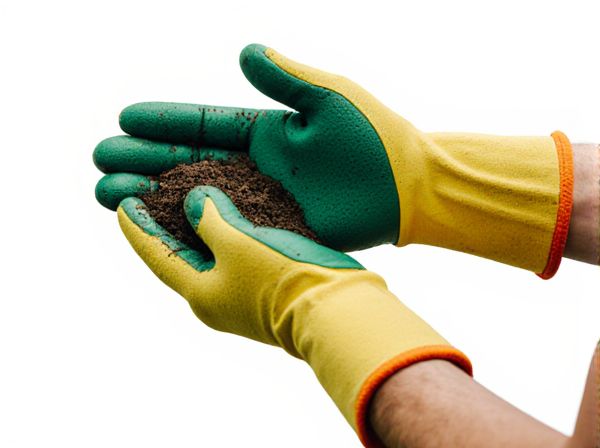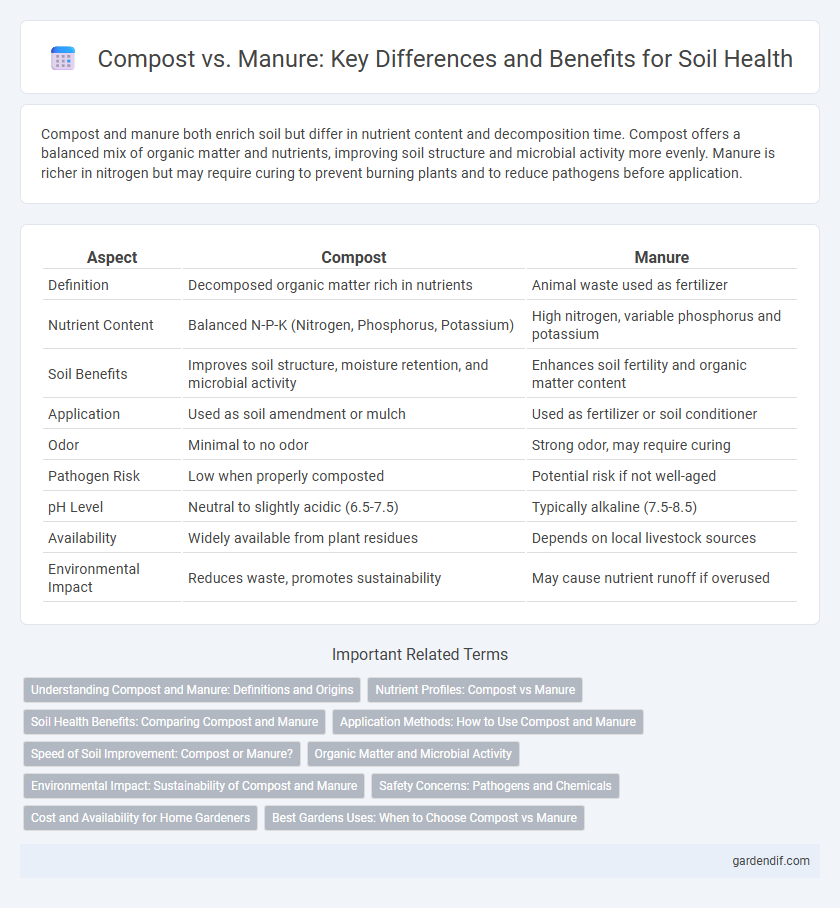
Compost vs Manure Illustration
Compost and manure both enrich soil but differ in nutrient content and decomposition time. Compost offers a balanced mix of organic matter and nutrients, improving soil structure and microbial activity more evenly. Manure is richer in nitrogen but may require curing to prevent burning plants and to reduce pathogens before application.
Table of Comparison
| Aspect | Compost | Manure |
|---|---|---|
| Definition | Decomposed organic matter rich in nutrients | Animal waste used as fertilizer |
| Nutrient Content | Balanced N-P-K (Nitrogen, Phosphorus, Potassium) | High nitrogen, variable phosphorus and potassium |
| Soil Benefits | Improves soil structure, moisture retention, and microbial activity | Enhances soil fertility and organic matter content |
| Application | Used as soil amendment or mulch | Used as fertilizer or soil conditioner |
| Odor | Minimal to no odor | Strong odor, may require curing |
| Pathogen Risk | Low when properly composted | Potential risk if not well-aged |
| pH Level | Neutral to slightly acidic (6.5-7.5) | Typically alkaline (7.5-8.5) |
| Availability | Widely available from plant residues | Depends on local livestock sources |
| Environmental Impact | Reduces waste, promotes sustainability | May cause nutrient runoff if overused |
Understanding Compost and Manure: Definitions and Origins
Compost is decomposed organic matter created through the controlled aerobic decomposition of kitchen scraps, yard waste, and other biodegradable materials, enhancing soil fertility and structure. Manure consists of animal waste, primarily from livestock such as cows, horses, and chickens, and provides essential nutrients like nitrogen, phosphorus, and potassium to the soil. Both compost and manure improve soil health but differ in nutrient concentration, decomposition process, and origin, with compost derived from plant-based materials and manure sourced from animal byproducts.
Nutrient Profiles: Compost vs Manure
Compost contains a balanced nutrient profile with moderate levels of nitrogen, phosphorus, and potassium, making it ideal for improving soil structure and moisture retention. Manure typically has higher nitrogen content but varies widely depending on the animal source, providing a more concentrated nutrient boost for plant growth. Both compost and manure enhance soil fertility, but compost offers a more stable nutrient release over time, while manure delivers a quicker nutrient availability.
Soil Health Benefits: Comparing Compost and Manure
Compost enhances soil health by improving its structure, increasing microbial diversity, and providing a balanced release of nutrients essential for plant growth. Manure enriches soil with high levels of nitrogen, phosphorus, and potassium but may introduce pathogens or weed seeds if not properly treated. Both compost and manure boost soil organic matter and fertility, but compost often offers a more stable nutrient profile and reduced risk of nutrient runoff.
Application Methods: How to Use Compost and Manure
Compost is typically applied as a top dressing or incorporated into soil prior to planting to improve soil structure and nutrient content gradually. Manure, often mixed with bedding material, should be aged or composted before application to reduce pathogens and nutrient runoff risk, then evenly spread or incorporated into soil for enhanced fertility. Both methods require proper timing, with applications ideally in fall or early spring to maximize nutrient availability and soil health benefits.
Speed of Soil Improvement: Compost or Manure?
Compost accelerates soil improvement faster than manure due to its well-decomposed organic matter, which quickly enhances soil structure and nutrient availability. Manure releases nutrients more slowly as it decomposes, offering long-term soil fertility but a delayed impact on immediate soil health. For rapid soil enrichment, compost is the preferred choice in gardening and agricultural practices.
Organic Matter and Microbial Activity
Compost contains higher concentrations of stabilized organic matter that improve soil structure and water retention, while manure offers fresh organic inputs that rapidly stimulate microbial activity. The humified organic compounds in compost enhance long-term soil fertility, whereas manure introduces diverse microorganisms and nutrients that boost immediate microbial biomass. Balanced application of compost and manure optimizes soil organic matter content and microbial dynamics for sustainable soil health.
Environmental Impact: Sustainability of Compost and Manure
Compost enhances soil health by recycling organic waste, reducing landfill methane emissions and improving carbon sequestration, making it a sustainable choice for long-term soil fertility. Manure, while rich in nutrients, can contribute to water pollution and greenhouse gas emissions if not managed properly, highlighting the need for controlled application to minimize environmental risks. Sustainable practices prioritize compost use and regulated manure handling to optimize soil quality and reduce ecological footprints.
Safety Concerns: Pathogens and Chemicals
Compost undergoes a controlled decomposition process that reaches temperatures high enough to kill most pathogens, making it safer for use in soil compared to raw manure. Manure often contains harmful bacteria, parasites, and chemical residues such as antibiotics or hormones, posing risks to human health and crop safety if not properly treated. Properly composted organic material reduces the risk of pathogen transmission and chemical contamination, promoting healthier soil ecosystems and safer agricultural practices.
Cost and Availability for Home Gardeners
Compost is generally more affordable and accessible for home gardeners since it can be produced from kitchen scraps and yard waste, reducing the need for purchasing materials. Manure, while nutrient-rich, often incurs higher costs due to sourcing, especially if organic or aged varieties are preferred for home gardens. Availability of manure can vary by region and may require more effort to obtain and store compared to the readily replenishable nature of homemade compost.
Best Gardens Uses: When to Choose Compost vs Manure
Compost is ideal for enriching garden soil with balanced nutrients and improving soil structure over time, making it perfect for vegetable beds and flower gardens that require steady nutrient release. Manure provides a more immediate nitrogen boost, beneficial for heavy feeders like corn and tomatoes, but should be aged properly to avoid burning plants. Use compost for long-term soil health and manure for quick nutrient supplementation in nutrient-demanding crops.
Compost vs Manure Infographic

 gardendif.com
gardendif.com